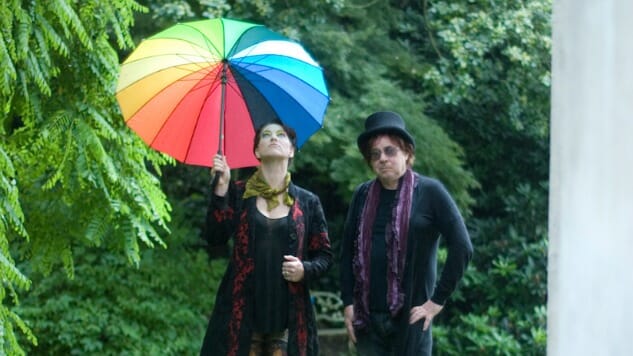Amanda Palmer: “An Artist’s Political Responsibility Is Not to Make Political Art”
On her new album with Edward Ka-Spel, I Can Spin a Rainbow, the former Dresden Doll basks in the power of collaboration.

Amanda Palmer has always been a bit of a lightning rod. Sometimes, her freewheeling nature can catalyze internet firestorms, such as when, in 2012, she asked musicians to perform as her touring backing band for free (they’d be paid in “”beer and hugs). This was after collecting about a million dollars from her fans via Kickstarter, which funded the creation of her record Theatre Is Evil and set of another round of criticism. When bombers attacked the Boston Marathon in 2013, Palmer posted a hastily written poem dedicated to one of the killers, “Poem for Dzhokhar,” to her blog, much to many readers’ chagrin. Finally, last year, she told The Guardian that “Donald Trump is going to make punk rock great again,” setting off another wave of internet indignity.
But those who know her best—especially fans who have connected with her music ever since her days in cabaret-pop duo The Dresden Dolls—understand the good in her intentions. She even credits her followers with helping her produce her latest project with her musical hero, Edward Ka-Spel of experimental troupe The Legendary Pink Dots. Using an online service called Patreon, which basically lets fans contribute cash toward their favorite artists’ work, Palmer and Ka-Spel created I Can Spin a Rainbow, a 12-song collection of soft-spoken, piano-draped sonic oddities.
“A woman writing a song about how it feels to be a woman in 2017, whether that involves pain, isolation, heartbreak, or abortion, is still a political act, because creativity in itself is a political act.”
“I cannot tell you how fucking weird it feels to have spent my entire music career trying to figure out, ‘How am I going to sell this thing I made?’ To now know you don’t have to sell the things you make anymore and that you just have to make them, you’re just going to be paid, it’s almost paralyzing,” she tells Paste. “I’m so used to having the artistic process, then having the whole extra process of, ‘Okay, I’ve made these songs, and now how am I going to put them out? How am I going to get them sold? How am I going to manufacture them?’”
Thanks to the internet, she says, “all that giant next step has just vanished.”
Palmer sounds equally elated at having gotten to create a full-length album with her idol, Ka-Spel. She first started listening to the Pink Dots as a teenager when her boyfriend at the time introduced her to them. “The Legendary Pink Dots were that band that I think everybody has when they’re a teenager, especially when they discover music outside of the mainstream,” she says. “They were that band for me. I was an obsessive collector, because their work was so esoteric and interconnected and sprawling, because they had so much material. In my mind, Robert Smith and Edward Ka-Spel were equals; they were both iconic musical figures.”
Check out the video for Amanda Palmer and Edward Ka-Spel’s “The Clock at the Back of the Cage”:
-

-

-

-

-

-

-

-

-

-

-

-

-

-

-

-

-

-

-

-

-

-

-

-

-

-

-

-

-

-

-

-

-

-

-

-

-

-

-

-








































